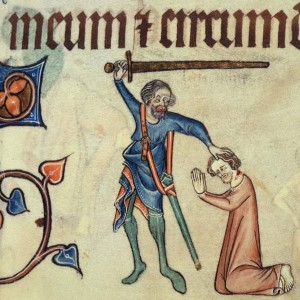This article examines three vernacular chronicles written from contrasting view-points: the Scalacronica of Sir Thomas Gray, whose father was linked with Edward II’s court, and the ‘Long’ and ‘Short’ continuations of the prose Brut, both markedly sympathetic towards Thomas of Lancaster, leader of the opposition to the king. This is a period which saw a sea change in the crown’s attitude towards rebellion, but the accounts of these chronicles suggest that a significant part of the political community did not accept the crown’s new definition of treason.
Radical Geneva? The publication of Knox’s First Blast of the Trumpet and Goodman’s How Superior Powers Oght to be Obeyd in context by Charlotte Panofre
John Knox’s First Blast and Christopher Goodman’s Superior Powers arguably represent two of the most radical pamphlets produced during the reign of Mary Tudor. Both texts were published in Geneva in early 1558 and attracted the displeasure not only of their authors’ fellow exiles, but also of Queen Elizabeth herself when she heard of their publication. Ever since, these pamphlets have been closely associated with the climate of radicalism which supposedly prevailed in Geneva under the aegis of Calvin. Yet, it is also clear from his writings that Calvin never went so far as to endorse any of the Marian exiles’ most controversial ideas. Rather, archival and bibliographical evidence suggests that it was the lively and highly competitive Genevan book trade, combined with inconsistent mechanisms of censorship and a system of monopolies favouring the wealthiest printing firms, which provided ideal conditions for the publication of these pamphlets.

